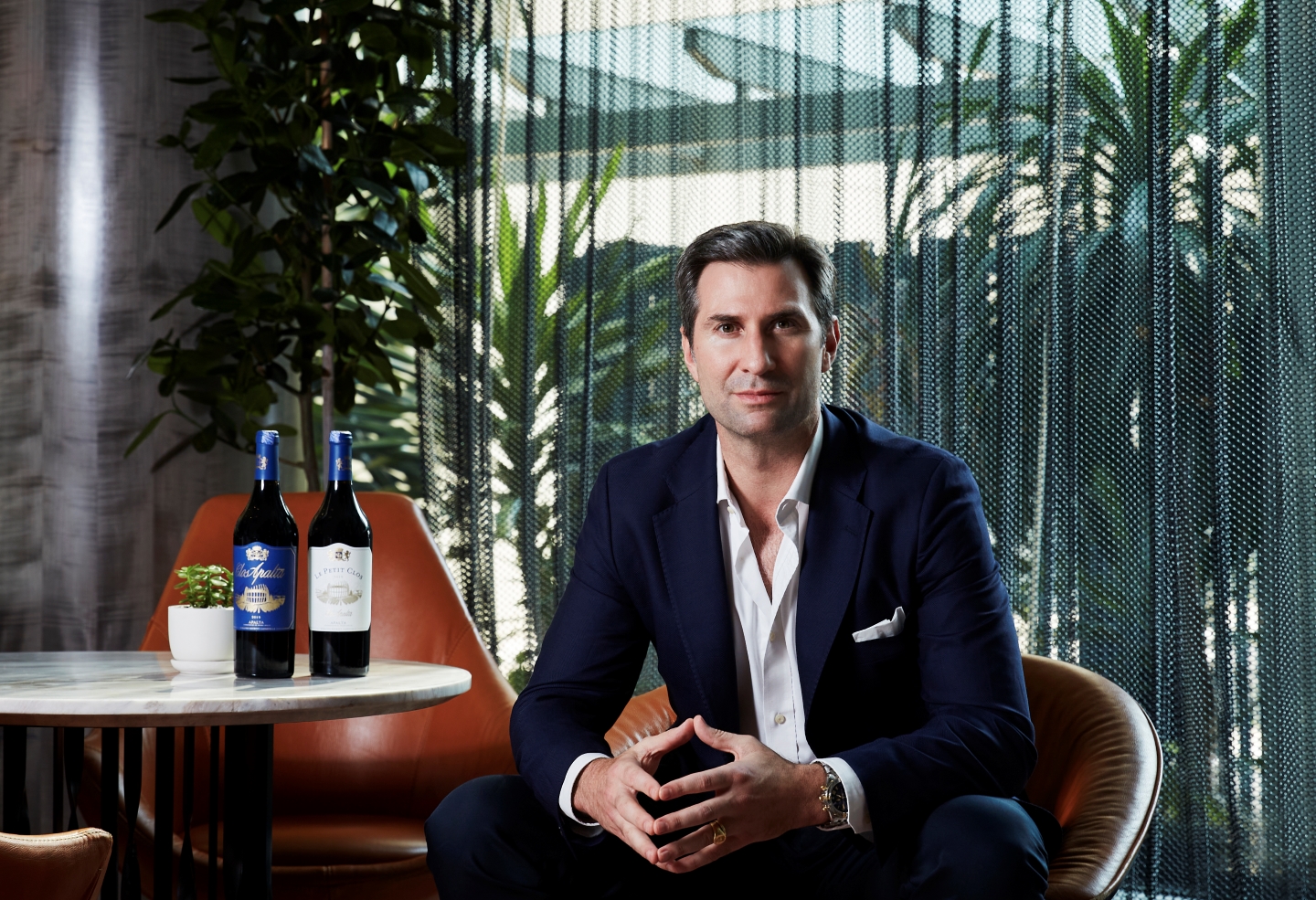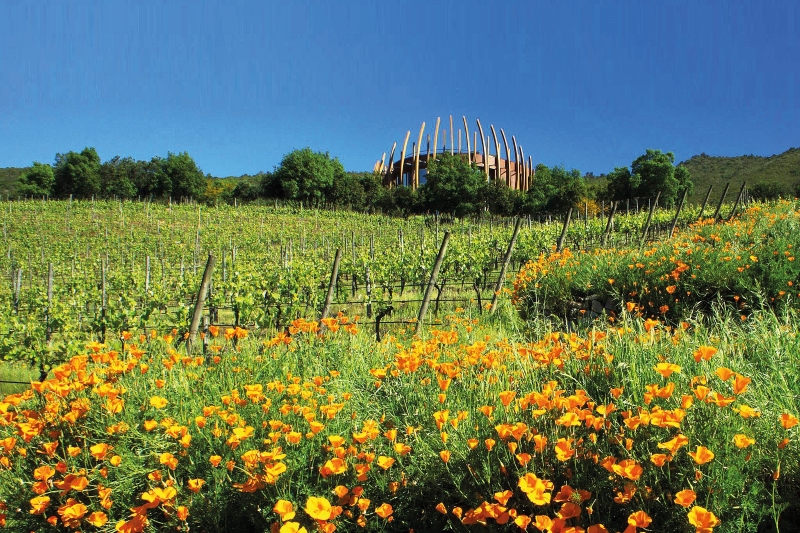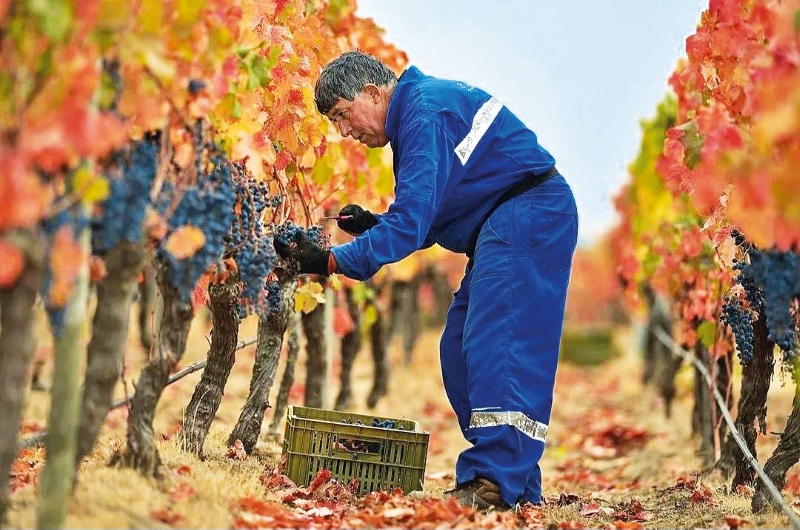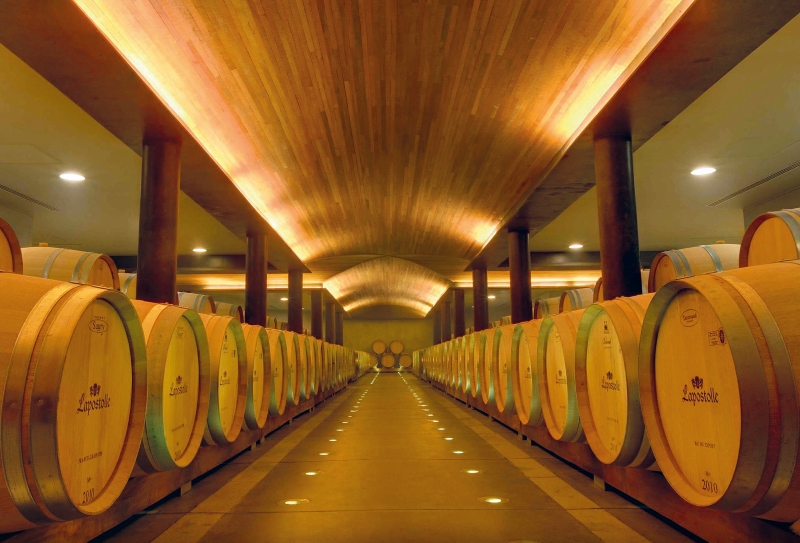
Although coming from an illustrious family, Charles considers himself blessed because he was raised to find his own path and was never coerced into joining the business (Photo: Soophye)
In the picturesque landscape of Chile’s Apalta Valley, a legacy of winemaking excellence started to take root in 1994 when Alexandra Marnier Lapostolle and her husband Cyril de Bournet, both French, were captivated by the South American region’s allure.
Their son Charles de Bournet Marnier Lapostolle, the seventh generation of the highly respected and pioneering wine and spirits company, Domaines Bournet-Lapostolle, currently helms the family business. With a storied legacy, their provenance can be traced all the way back to 1827 when Jean-Baptiste Lapostolle first built a distillery in a small city outside of Paris.
His granddaughter Julia entered into matrimony with Louis-Alexandre Marnier, who comes from a family of wine merchants responsible for the distribution of Lapostolle’s products. It was he who introduced the world to the iconic Grand Marnier orange and cognac liqueur in 1880. In 2016, the renowned French brand was acquired by the Italian spirits group Campari for a staggering €684 million.
During a recent visit to Kuala Lumpur for a Clos Apalta wine-pairing dinner at the Banyan Tree KL put together by Milawa, one of Malaysia’s top wine importers and distributors, Charles conveyed the rich history of the Lapostolle estate, his family’s grand transatlantic move and its significance in the world of winemaking.
“I’m uncertain about our influence on the global winemaking scene but we certainly made a notable impact in Chile,” the CEO of Domaines Bournet-Lapostolle humbly admits. “As the seventh generation in this enduring family enterprise in one of the world’s most ancient industries, our unwavering pursuit has always been to offer premium creations.”
When his parents initially came across this part of the valley, they recognised it as an old vineyard but could not ascertain its age. They knew it was special and that was why, from making wine and spirits in France, the couple made the big move to Chile. Of course, they are now well aware of its true age, which dates back to 1907.
Today, the valley thrives with an abundance of lush vineyards of renowned grape varieties, including Cabernet Sauvignon, Merlot and Carmenère. “My parents were very intrigued by the fact that the country remains free of the phylloxera louse that eats grapevine roots. They just knew they had found a truly unique land where they could produce not only the finest wines in Chile but also the world,” he says.
When comparing today’s wine production landscape in Chile with that of the early 1990s, one can discern multiple transformations, some of which can be attributed to Charles’ family and other pioneers who ventured here with the aspiration of creating outstanding wines. Château Lafite Rothschild joined forces with local wine producer and exporter Los Vascos, while Château Mouton Rothschild partnered Concha y Toro. Together, they harnessed the previously undiscovered potential of the country’s terroir.
the_epitome_of_the_clos_apalta_experience_is_staying_at_the_familys_private_residence_and_having_the_best_of_wine_and_dine.jpg

A whole new world
The visionary approach of Charles’ parents transformed the company into a pioneer in the Chilean wine industry, with a strong emphasis on sustainability and a commitment to create world-class wines by combining French expertise with Chile’s terroirs.
Lapostolle wines are renowned worldwide for their quality and remarkable ability to capture the essence of this South American country within a horseshoe-shaped valley with decomposing granite slopes, formed by the Coastal Cordillera.
Lapostolle grapes come from three unique places — Clos Apalta, Clos du Lican and San José. The first area, near the city of Santa Cruz and about 170km southwest of Santiago, benefits from a unique north-south exposure that is an unusual find in Chile. With the Tinguiririca River to the south and the Coastal Range’s hills forming a protective spine, the terroir’s character is shaped by ancient soils with a diverse geologic history, creating the ideal foundation for the Bordeaux varietal wines.
“When it rains, the water naturally drains into the river. And we have natural protection from the sun because our vineyards are located to the west of Apalta Valley, which gives us two hours less sun than any other wine producers in Chile. With that, our wines have a higher natural acidity and lower alcohol,” says Charles.
Perched on a hillside about 5km from Clos Apalta, the Clos du Lican vineyard is surrounded by a native forest and features granite-based soils. Its southern exposure and diverse slopes create a terroir that stands as a testament to nature’s artistry. “The soil is great for winemaking but it’s very poor, so it gives the wines a unique taste, with a hint of pencil lead or graphite that comes from the granite,” he explains.
On the other hand, located between the Andes and Coastal Mountains, the San José Vineyard benefits from light slopes, diluvial terraces and ancient soils. Thanks to the Cordillera’s cooling influence, there is a harmonious balance of sun exposure for the vines. It allows for the cultivation of a diverse range of varietals from the South of France, including Mourvèdre, Cinsault, Grenache and Syrah.
The Lapostolle winery, nestled in Cunaco near Santa Cruz, is the epicentre of this winemaking journey. With its traditional Chilean hacienda design, it is here that the brand’s commitment to quality is brought to life. The production facility boasts state-of-the-art equipment and a dedication to sustainable practices, ensuring their wines meet the highest standards.
“Apalta is unique with a distinctive and complex geography. In our Clos Apalta’s 160ha vineyard, we have more than 53 microclimates and this abundance is considerably higher than what is typically found in other regions worldwide,” says Charles, referring to the diverse climatic conditions within small areas, such as individual rows of vines or specific sections of the vineyard.
carmenere_is_harvested_at_the_onset_of_autumn_and_its_distinctive_red_colour_is_a_lovely_addition_to_the_green_vineyard.jpg

Climate change
Since its inception, Lapostolle has maintained a steadfast commitment to sustainable viticulture, recycling, water conservation and energy efficiency, further solidifying its role as a steward of the environment.
“When wineries discuss sustainability, the conversation often centres on organic or biodynamic methods, primarily within the vineyard. However, our approach extends beyond that. We consider the broader impact of our practices on both the people working in the vineyards and those living in the surrounding areas, as well as the associated social and economic aspects,” says Charles.
He explains that the perpetual challenge lies in Mother Nature, an unpredictable force that changes from one season to another. However, there remains one constant — the steady rise in temperatures each year, which unmistakably manifests the impact of global warming on the wine and spirits industry.
“About 15 years ago, Chile was somewhat steady, so much so that people often said it was boring. But not any more. In 2016, we encountered rainfall during the harvest season for the first time. The subsequent year brought wildfires three times larger than those in California, yet they received minimal attention. We were fortunate to have a successful vintage in 2018, but the following year witnessed record-breaking heat,” he points out.
The weather has become increasingly extreme, be it hot or cold, and Chile is experiencing heatwaves more frequently, a phenomenon that was previously uncommon. It is becoming harder to read the weather but similar to other industries, sustainability is the way forward and it is crucial to ensure the well-being of all stakeholders, Charles thinks.
Continuing the legacy
“The weight of responsibility is huge, particularly within my family, where we’ve enjoyed a successful 200-year legacy in the business. There’s a deep-seated desire to not be the one who jeopardises this long-standing history and I don’t want my daughter to see me in that light. It’s not just for her I’m committed to the cause, it is also for the people who work tirelessly alongside us at the winery and throughout the entire business,” says the father of a two-year-old girl.
Charles never planned to join the family business and his appointment as CEO was not due to his parents but rather the decision of other board members.
“Working in a family business is challenging as it can alter the dynamics of personal relationships. I had sporadically worked with my parents but without full commitment, although I contributed my share. In 2010, I founded a business focusing on pisco, a Chilean brandy made with muscat grapes and steel brought over from Cognac. This venture led to my assuming the role of CEO at Perigee, overseeing the production of Kappa Pisco in Chile.”
the_first_year_barrel_room_where_the_shape_of_the_southern_cross_on_the_ceiling_recalls_the_constellation_that_points_to_the_south_pole.jpg

Prior to that, he was managing the operational activities of the renowned winery known for its exceptional wines, including the Cuvée Alexandre collection and the prestigious Clos Apalta. Before joining the family business, he worked as a project manager at a consultancy specialising in creating value for clients by offering comprehensive solutions, aligning corporate strategies with IT.
“As I travelled extensively to promote pisco and ensure strong exports, I naturally took charge of the commercial aspects since I was meeting all of our wine importers. During that time, we faced challenges with the CEO and the board suggested expanding my responsibilities, considering my effective management of pisco and my parents’ increased involvement in the corporate office in Paris, which left them with less time in Chile.”
Having taken the reins of the company in 2013, Charles describes his 10-year journey as paved with a lot of changes, being “part of preparing for the Lapostolle of tomorrow”.
“Long-term thinking is very important in any family business. We think in respect of generations, not five-year plans. That is key and it changes the decisions you make every day. I’m lucky to have my parents, grandfather, uncles and key decision-makers around me and to feel their passion.
“My grandfather was drinking wine and asking after the harvest and the business till his last breath. It really fuels you to go beyond and look at the spirit of entrepreneurship up close. My parents went off the beaten path and every generation before them added something. That’s special.”
Although coming from an illustrious family, Charles considers himself blessed because he was raised to find his own path and was never coerced into joining the business. “I take great pride in my parents and their remarkable achievements. I aspire to embody the best qualities they’ve instilled in me.”
Fine wine
Underscored by the tagline “French in essence, Chilean by birth”, the name Lapostolle carries historical significance. “Though it resembles a religious name, its origins are linked to Neauphle-le-Château near Versailles, where the brand was founded. However, the exact meaning remains somewhat elusive,” says Charles.
One thing remains clear though, Lapostolle’s Clos Apalta wines have consistently earned critical acclaim. They received perfect scores of 100 points in assessments by the renowned international critic James Suckling for the 2014, 2015 and 2017 vintages. In addition to its outstanding wines, the Clos Apalta vineyard was recognised as the sixth best in the world in 2019 by William Reed Business Media, further highlighting the brand’s commitment to excellence.
“Currently, Lapostolle has three vineyards, each with a clos or walled vineyard. For our entry-level brand selection, we use 50% to 100% grapes from our vineyards, depending on the grape variety. We are not a single estate but more varietal-centric. Our goal is to transition to 100% estate-grown grapes by the end of 2025,” he says.
Moving up the premium wine selections, Lapostolle becomes more precise in its sourcing. While it does purchase grapes from other sources, it plans to change this in the future. The level of precision applied to crafting Parcelle 8’s single block varietal wine guarantees exceptional quality, making it a truly unique and special product. “This wine is made from the very first block of vines that caught my parents’ attention when they arrived in Apalta, and it contains 100% Cabernet Sauvignon planted back in 1907. It’s a one-of-a-kind wine in the world,” says Charles.
“Our family’s private home in Clos Apalta is the most prestigious domain we own in Chile, surrounded by the vines and valley. Its modern architecture makes it stand out and it is perfect to relax, appreciate the scenery and indulge in the best of our wines and food,” he says enthusiastically about the residence that was built in 2006 and opened to the public two years later under the Relais & Châteaux banner as their smallest property with four rooms. It now boasts 12 rooms.
The journey through the generations has been remarkable. Now, it is Charles’ moment to step into the forefront of the Lapostolle family’s triumphant legacy and craft his own unique story. “I’m continually asking myself, ‘How can I reach greater heights?’ It’s this relentless pursuit that propels me forward.” And indeed, as his ancestors have shown, hard work, a visionary mindset and always looking onwards and upwards is the perfect way to future-proof any business. Salut? Salute, more like.
This article first appeared on Oct 30, 2023 in The Edge Malaysia


